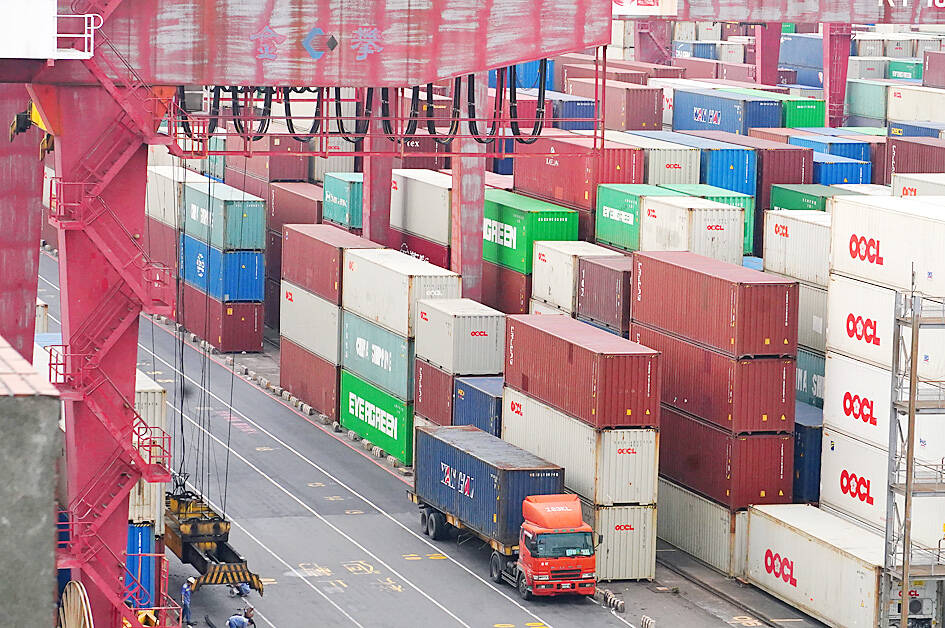Export orders last month rose 19.8 percent year-on-year to US$56.4 billion, marking the third month of consecutive increases and hitting the highest level for the month, the Ministry of Economic Affairs said yesterday.
The rise accelerated from the 12.5 percent annual increase recorded in March and exceeded the 6.2 to 10.4 percent growth forecast by the ministry last month.
On a monthly basis, export orders — an indicator of product and component shipments to overseas markets over the following one to three months — increased 6.3 percent, the ministry said in a report.

Photo: CNA
The ministry attributed the stronger-than-expected performance to the steady demand for goods related to artificial intelligence, high-performance computing and cloud computing services, while the US’ temporary pause in implementing high tariffs also led customers to front-load goods in advance, it said.
For instance, export orders last month for electronic components increased 35 percent year-on-year, orders for information and communications technology (ICT) products grew 20 percent, and those for optoelectronic products gained 4.2 percent, the latest data showed.
However, the weak demand in some traditional industries and firms losing orders amid price competition from foreign peers offset part of the growth, the ministry said.
Export orders last month for plastic and rubber products decreased 8.8 percent year-on-year, and those for base metal products fell 11.1 percent, while orders for chemical products were flat from a year earlier and those for machinery goods increased 5.8 percent, the ministry’s data showed.
By destination, orders last month from Southeast Asia registered the largest annual increase of 32.8 percent, followed by a rise of 30.3 percent in orders from the US, the ministry said.
Orders from China, including Hong Kong, grew merely 5.7 percent year-on-year last month, compared with a rise of 10.5 percent in orders from Europe and 16.3 percent growth in orders from Japan, it said.
It said that in its recent poll of domestic manufacturers, only 11.4 percent said they were optimistic that export orders would increase this month from last month, while 48.8 percent said that orders would be flat and 39.8 percent expected them to decline.
In addition, the diffusion index of export orders — a gauge of manufacturers’ expectations on export orders for the following month — rose to 49.5 from 47.4 the previous month, but was below the threshold of 50, suggesting that manufacturers remain cautious, it said.
As a result, export orders this month are forecast to reach between US$55 billion and US$57 billion, representing from a monthly decrease of 2.5 percent to a monthly increase of 1.1 percent, and an annual increase of 12.5 to 16.6 percent, it said.
Last month’s export orders brought cumulative orders in the first four months of the year up 14.1 percent year-on-year to US$205.87 billion, ministry data showed.

IN THE AIR: While most companies said they were committed to North American operations, some added that production and costs would depend on the outcome of a US trade probe Leading local contract electronics makers Wistron Corp (緯創), Quanta Computer Inc (廣達), Inventec Corp (英業達) and Compal Electronics Inc (仁寶) are to maintain their North American expansion plans, despite Washington’s 20 percent tariff on Taiwanese goods. Wistron said it has long maintained a presence in the US, while distributing production across Taiwan, North America, Southeast Asia and Europe. The company is in talks with customers to align capacity with their site preferences, a company official told the Taipei Times by telephone on Friday. The company is still in talks with clients over who would bear the tariff costs, with the outcome pending further

WEAKER ACTIVITY: The sharpest deterioration was seen in the electronics and optical components sector, with the production index falling 13.2 points to 44.5 Taiwan’s manufacturing sector last month contracted for a second consecutive month, with the purchasing managers’ index (PMI) slipping to 48, reflecting ongoing caution over trade uncertainties, the Chung-Hua Institution for Economic Research (CIER, 中華經濟研究院) said yesterday. The decline reflects growing caution among companies amid uncertainty surrounding US tariffs, semiconductor duties and automotive import levies, and it is also likely linked to fading front-loading activity, CIER president Lien Hsien-ming (連賢明) said. “Some clients have started shifting orders to Southeast Asian countries where tariff regimes are already clear,” Lien told a news conference. Firms across the supply chain are also lowering stock levels to mitigate

NEGOTIATIONS: Semiconductors play an outsized role in Taiwan’s industrial and economic development and are a major driver of the Taiwan-US trade imbalance With US President Donald Trump threatening to impose tariffs on semiconductors, Taiwan is expected to face a significant challenge, as information and communications technology (ICT) products account for more than 70 percent of its exports to the US, Chung-Hua Institution for Economic Research (CIER, 中華經濟研究院) president Lien Hsien-ming (連賢明) said on Friday. Compared with other countries, semiconductors play a disproportionately large role in Taiwan’s industrial and economic development, Lien said. As the sixth-largest contributor to the US trade deficit, Taiwan recorded a US$73.9 billion trade surplus with the US last year — up from US$47.8 billion in 2023 — driven by strong

RESHAPING COMMERCE: Major industrialized economies accepted 15 percent duties on their products, while charges on items from Mexico, Canada and China are even bigger US President Donald Trump has unveiled a slew of new tariffs that boosted the average US rate on goods from across the world, forging ahead with his turbulent effort to reshape international commerce. The baseline rates for many trading partners remain unchanged at 10 percent from the duties Trump imposed in April, easing the worst fears of investors after the president had previously said they could double. Yet his move to raise tariffs on some Canadian goods to 35 percent threatens to inject fresh tensions into an already strained relationship, while nations such as Switzerland and New Zealand also saw increased